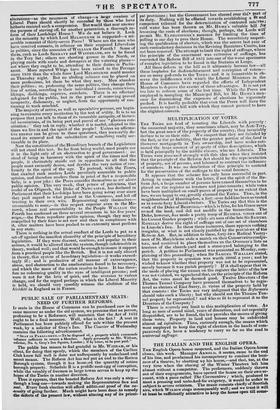PUBLIC SALE OF PARLIAMENTARY SEATS : NEED OF FURTHER REFORMS..
IF seats in the House of Commons can be purchased now in the same manner as under the old system, we presume that no person, professing to be a Reformer, will maintain that the Act of 1832 ought to be a final measure. Well, what is the fact ? A seat in Parliament has been publicly offered for sale within the present week, by a solicitor of Gray's Inn. The Courier of Wednesday contains the following advertisement.
"SEAT IN PARLIAMENT.—To be disposed aka property which commands influence sufficient to return a Member. Apply personally to Mr. Witham, solicitor, No. 8, Gray's Inn Square, London ; if by letter, to be post paid." The public has reason to feel grateful to Mr. WITHAM, or his -client, for doing that openly, which the members of the Carlton Club know full well is done not unfrequently by underhand and secret means. The Reform Act has not put an end to the Rotten Borough system, though it has lessened the quantity of rotten borough property. Schedule B is a prolific nest-egg of corruption, while the venality of freemen in large towns serves to keep up the hopes of the Tories in another direction.
Thus it appears, that the boasted Reform Act was only a step— though a long one—towards making' the Representation free and real. Every fresh election will afford additional proof of the ne- e:essity of going further. Much might have been done .to remedy the defects of the present law, without altering any of its princi- pal provisions ; but the Government has slurred over this' Port of its duty. Nothing will be effected towards establishing a It and competent tribunal for the determination of contested retOrns; cold water has been thrown on Mr. HOME'S valuable bill for lessening the costs of elections; though, perhaps, the Lords will. permit Mr. ELeniesTorse's measure for limiting the time .of polling to one day to pass their House. The uncertainty respect- ing the qualification of electors, which was the source last year of such contradictory decisions in the Revising Barristers Courts, has not been removed. The attempt to limit the right of suffrage, where the principle of the enactment was extension of suffrage, has converted the Reform Bill of 1831 into one of the worst specimens of complex legislation to be found in the Statutes at Large.
All these defects in the bill as it ultimately became law—all these loopholes for disfranchisement and corruption of voters— are so many god...ends to the Tories; and it is lamentable to ob- serve the indifference with which the Liberal Ministers in the House of Commons have regarded the efforts of Independent Members to deprive the enemy of these advantages. It is not yet too late to redeem some of the lost time. While the Peers are employed in mangling the Municipal Bill, let Mr. HUME'S mea- sure fur diminishing the expenses of elections be vigorously pushed. It is hardly probable that even the Peers will have the assurance to reject a bill with which they cannot pretend to have the slightest concern.


























 Previous page
Previous page